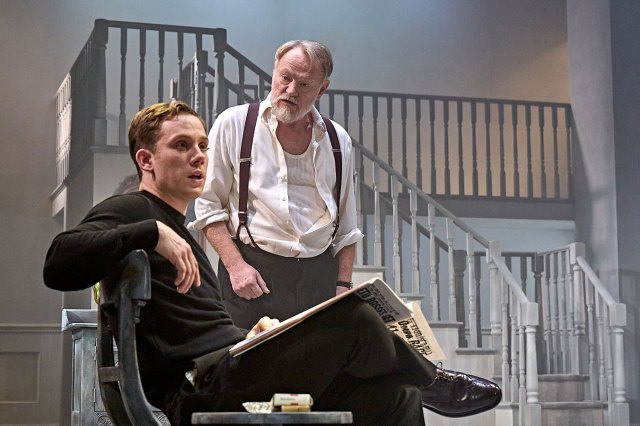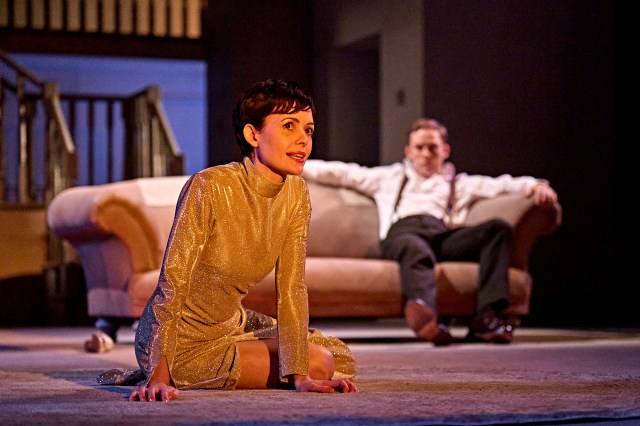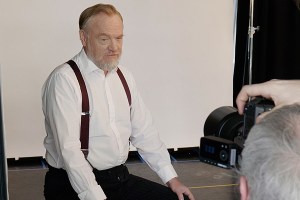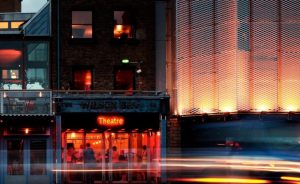The Homecoming at the Young Vic – review
Matthew Dunster’s star-studded revival runs until 27 January

Enigmatic, ambiguous and inscrutable are words often used to describe Harold Pinter’s 1965 play The Homecoming, in which a woman, both madonna and whore, arrives in a house full of men. Nasty, brutish and misogynistic would be the adjectives I’d choose.
I can see that it has a perfect structure and admire the finely judged weight of its dialogue, its zest for the way words work. I can see that it is a clear-eyed study of power and sex, and the way both cannot be separated from one another. But even a good production leaves me cold.
Matthew Dunster’s staging at the Young Vic is full of stars – Jared Harris as the paterfamilias Max, Joe Cole (Peaky Blinders) as the smooth-talking pimp Lenny, Lisa Diveney of Call the Midwife fame as the disruptive Ruth.
It also looks unbelievably stylish. Loud jazz music and smoke fill the auditorium as the audience enters, revealing a thrust stage with a bare grey room, designed by Moi Tran, with a staircase rising at the back and a mirror where all the men casually check their appearance as they pass. It’s a cross between bleak and fashionable, with one bowl of green apples and a green brick fireplace front of stage providing colour.
In this arena, the men come to preen and bob, like Joey (David Angland), youngest brother of three in this motherless house, a demolition worker who dreams of being a boxer. The trouble is, as Max cruelly remarks, “you don’t know how to defend yourself and you don’t know how to attack.”
He is just one inadequate in a house full of them, hiding their fears under vicious bluster. When Harris’s Max limps in, his sparring with the savage Lenny appears almost rehearsed, a daily ritual of pain in which Max’s dead wife is alternately described as a saint and a slut. As the rest of the testosterone-driven pack appears, the same whiff of toxicity arises; Max bullies his prissy brother Sam (Nicolas Tennant) and idolises his dead friend Max.
Dunster’s direction emphasises the underlying violence but also the sense of a disrupted, unhappy past, where nothing is absolutely as it seems. Sally Ferguson’s lighting and George Dennis’s sound highlight key moments with a spotlight of harsh white and a screech of jazz. When the final brother Teddy (Robert Emms) turns up in the middle of the night, leaving behind his job as a philosophy professor for a tour of Europe, and bringing his wife, whose existence has been secret for six years, the stage is set for a second act of new power plays and recriminations.

Events culminate, famously, in Ruth seemingly agreeing to be set up in a flat in Soho, to work as a prostitute while carrying out other duties in the family home. It is Teddy who is the outsider. She sheds her inhibition to fulfil a vital role in controlling the venomous, masculine culture he has left behind.
My problem with the play is that the only way Ruth can attain power is by adopting a role that feels like a male fantasy even as she assumes it. Would a woman really be so willing to abandon three children to serve as a lover and mother to the vicious men assembled here? Even if Pinter is not aiming for psychological realism, the patterning feels forced. Diveney, clothed in a magnificent 60s wardrobe, gives her a great deal of watchful agency, head often on one side, power coiled within her, assessing her advantage. She gives Ruth credence but only just.
She’s matched by Cole who brings a dangerous, biting energy to Lenny, skipping around the room as he eggs on his family in their predatory, rapey remarks. Harris as Max hides his own inadequacies beneath bluster; he is pathetic at the close, dancing to pretend he is young and then collapsing in a heap.
At moments, this Homecoming is played like a dark drawing room comedy, skating along the surface of the play. Perhaps there are no depths to be discovered. I begin to wonder.
















